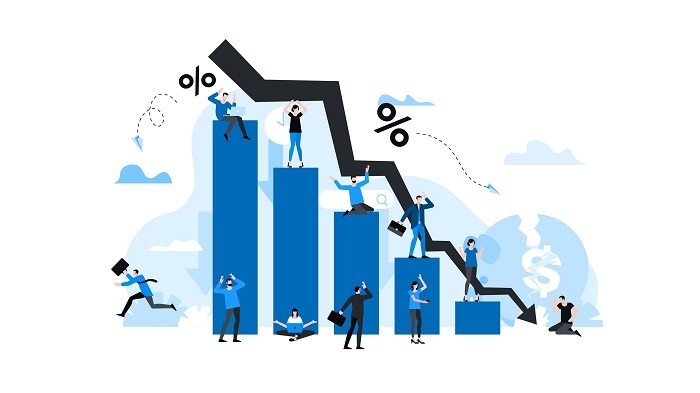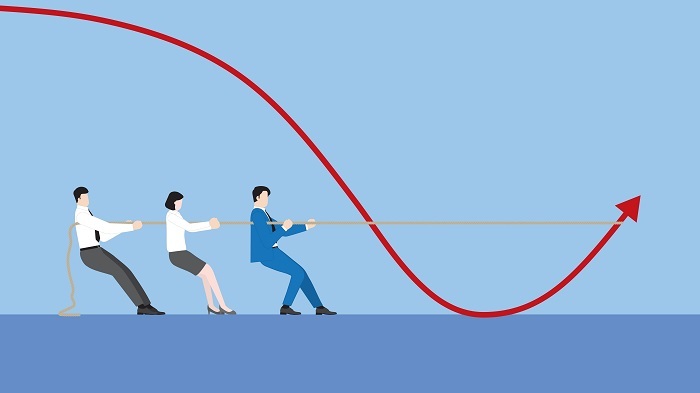
 Data Structure
Data Structure Networking
Networking RDBMS
RDBMS Operating System
Operating System Java
Java MS Excel
MS Excel iOS
iOS HTML
HTML CSS
CSS Android
Android Python
Python C Programming
C Programming C++
C++ C#
C# MongoDB
MongoDB MySQL
MySQL Javascript
Javascript PHP
PHP
- Selected Reading
- UPSC IAS Exams Notes
- Developer's Best Practices
- Questions and Answers
- Effective Resume Writing
- HR Interview Questions
- Computer Glossary
- Who is Who
The Good Side of Recession
The duration of the downturn in the economy or a drop in trade and commerce is often referred to as a recession in an organization. The popularity of goods and services often declines throughout a recession, which lowers revenues and sales for businesses. In consequence, this can lead to businesses reducing expenses, staffing levels, and strategies to grow.

The economic success of an organization, alongside the success of its staff and clients, can be significantly impacted by a recession. During or after a recession, businesses could find it difficult to stay profitable, and workers might lose their jobs or have their duties or pay decreased. Consumers could also alter their buying patterns by choosing more cheap options or delaying transactions entirely.
Using measures like cost-cutting, extending their products or services, looking into developing companies, and investing in technological advancement and effectiveness may be necessary for businesses to survive a recession. Throughout the effort to endure a storm and emerge victorious on the reverse side of a recession, it is critical for businesses to be preemptive and adaptive.
In addition, there are instances when a recession presents an opportunity for businesses to reconfigure their systems, spot bottlenecks, and concentrate on development and protracted success. In this respect, a recession may be a force for welcome decisions, but only if businesses are prepared to adjust and efficiently handle the difficulties it brings.
How Recession Can Be Good for an Organization?
Although a recession is typically a challenging market time, it may also offer opportunities for companies to strengthen their processes and survive the recession. An organization can benefit from a recession in the following ways ?
Expense efficiency ? During a recession, businesses might require making cuts to stay afloat. This may be an excellent chance to find waste and simplify processes. Organizations may have become lighter and more economical by cutting needless costs, which may also support their ability to compete long after the recession has ended.
Development ? When businesses explore alternative techniques to bring in money or better represent their clients, a recession may increase creativity. As an illustration, after the 2009 financial crisis, a number of digital companies appeared with novel services and goods that answered the evolving demands of customers and businesses.
Targeted acquisitions ? During a recession, businesses may be able to buy struggling firms or resources for less money. Reducing the risks involved with sustainable growth, can really assist companies in expanding their competencies and share of the market.
Talent acquisition ? A lot of bright people may indeed be searching for new possibilities during the recession when their existing firms cut back on staff or close their organization. Corporations may have the chance to hire outstanding personnel now that they might not have been able to at a time of economic growth.
Customer retention ? Companies that have the capacity to survive a recession while continuing to offer increased services and goods might develop a following of loyal customers that could also endure long after that the crisis has ended. The long-term economic benefit may be maintained by businesses thanks to this.
It is important to remember that these possibilities are not promised and are based on a number of variables, including the company's industry, liquidity position, and governance. Nonetheless, businesses that have the capacity to adjust and react to the difficulties posed by a recession may become more powerful and resilient than they were previously.
The Impact of Recessions on Businesses
Organizations can be significantly impacted by recessions, and the extent to which they're affected can vary depending on a number of variables, such as the type of recession, the industry sector for which the firm works, and the stability of the company's business administration and personal finances. Recessions may have a variety of effects on organizations, including the following
Reduced demand for merchandise and services ? Throughout a recession, household spending often falls as individuals seem to be more frugal with spending resources. This may result in less interest in the items and solutions provided by enterprises, which may translate into lower sales and earnings.
Greater competitiveness ? Throughout a recession, firms would need to engage in even more fierce rivalry for a reduced customer base. This may result in fierce pricing battles and many other sorts of depleting profitability.
Tighter credit requirements ? During a recession, financiers may be more hesitant to give loans to firms, which might make it harder for enterprises to get the money they really have to spend on expansion or sustain operations.
Expense strategies ? In order to withstand a recession, firms could be forced to employ expense strategies such as personnel reductions, salary or cuts to services, or postponing purchases of novel machinery or infrastructure. While these actions can aid firms in surviving the recession, they can additionally have a detrimental effect on staff morale and output.
Glitches in the production process ? Recessions may have a significant impact on all parts of the economy, which can result in supply chain problems and higher global price instability. Companies that depend on intricate supply networks may be more susceptible to these interruptions.
Doubt and risk ? When there is unpredictability and risk, it can be challenging for firms to plan ahead or achieve significant investments. This may lead to a shortage of trust between investors as well as other parties involved, which might make the recession worse.
While recessions could have a substantially detrimental effect on businesses, it's crucial to remember that even some companies may be better prepared to withstand the storm than most others. Businesses that have experienced administration, sound financial standings, and the capacity to swiftly react to fluctuations in the market may have a higher chance of surviving and even thriving throughout a recession.
Difference Between Recession and Inflation in an Organization

Although both recession and inflation are economic events that possess the potential to significantly affect businesses, they are substantially different from one another.
A recession is a time when business investment significantly declines. It is often marked by declining GDP, depressed wages, and declining consumer expenditure. The market for goods and services generally decreases during a recession, which can result in lower income and earnings for firms. This may lead to cost-cutting initiatives like laying off employees, decreasing compensation, or deferring expenditures in business expansion potential.
On the opposing hand, inflation refers to a long-term, steadily rising level of prices for most items and amenities across a sector. The purchasing decision of capital can be reduced by inflation, increasing prices for firms. While they might not be capable of taking on additional costs to clients, organizations that depend on set price structures may find this to be terribly challenging. Higher mortgage rates brought on by inflation may make obtaining financing for firms costlier.
Conclusion
Despite the fact that they may have considerable damaging consequences on both companies and consumers, recessions can also have some positive aspects. Companies that are prepared to weather the storm could find themselves in a situation to make the most of prospects, such as hiring employees or purchasing assets, and they may also be capable of adjusting to the shifting competitive landscape. A recession may have several advantages, such as ?
Chance for imagination and invention.
greater productivity and performance.
chance for expansion through combinations of businesses.
Possibility of having easier utilization of assets and skills.
Possibility to review and reorder business plans.

